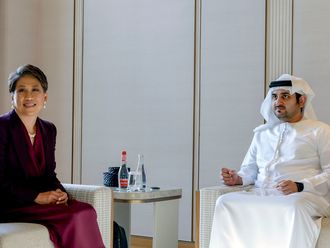Puerto Vallarta, Mexico: Mexico said yesterday it had reached an accord with China aimed at promoting fairer bilateral commerce and announced joint business deals and investment worth some $560 million (Dh2 billion).
Mexico's Economy Ministry said the agreement with Beijing would stop "unfair Chinese practices" in shoemaking, one of the main industries in Mexico to complain that China is flooding it with cheap imports.
The two signed business deals worth $300 million and agreed on new investments worth $260 million, the ministry said. It did not provide further details.
"This new relationship looks to answer the imbalance that affects Mexico and establish a basis for more balanced and sustainable trade in the long term," the ministry said.
China is Mexico's third-biggest export market outside North America, and the two nations compete to sell manufactured goods to US consumers.
Chinese investment has traditionally been very modest in Mexico, but it has picked up this year.
The balance of trade between the two developing economies is heavily tilted in favour of the Asian giant, which now provides Mexico with roughly 15 per cent of its imports. Less than 2 per cent of Mexico's exports go to China, with nearly 80 per cent of them heading to the US. However, Mexico has been moving away from its dependence on the US in the last few years. "It's a fact that the most dynamic region on the planet is Asia. That's the reality," said Francisco de Rosenzweig, Mexico's undersecretary for foreign trade.
"Latin American and global businesses with new investments are looking to make the most of the comparative advantages in China."
Open market
De Rosenzweig added that a planned Mexican trade mission to China was likely this summer.
Mexico's announcement coincided with the close of a trade meeting of the Group of 20 economic powers in the Mexican Pacific resort of Puerto Vallarta, where ministers agreed to support open markets and oppose protectionist measures.
The controversy over Argentina's plan to seize a controlling stake in oil company YPF from Spanish firm Repsol cast a shadow over the trade session, but Mexican Economy Minister Bruno Ferrari said it was never part of the formal agenda.
Responding to a question about whether or not Argentina, a G20 member, should be expelled from the group over its plans to nationalise YPF, Ferrari said "absolutely not."
"That subject wasn't taken up or discussed," he added.
Still, many G20 officials expressed worry that Argentina's plan could undermine investor confidence in the region.
"It's not just an effect on Argentina, but the effect could be felt more widely than that," Norman Lamb, British minister for employment relations, told Reuters.












